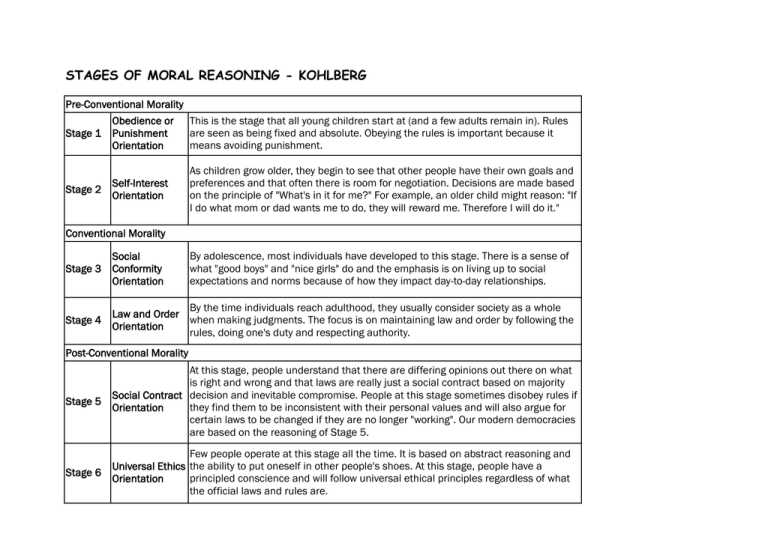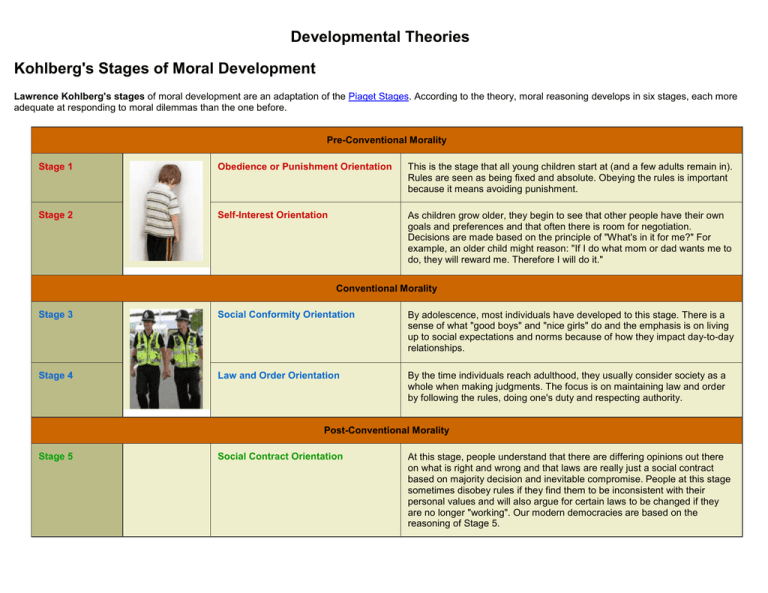What Best Describes Kohlberg's Stage 1 Level 3 Punishment-obedience Orientation
Individualism instrumental purpose and exchange is the second stage in Kohlbergs model. Right action is that which is instrumental in satisfying the selfs needs and occasionally others.

Kohlebergs Stages Of Moral Reasoning 9re Ep
Stage 1 Obedience and Punishment.

. The first stage of this level stage 3 is characterized by an attitude which seeks to do what will gain the approval of others. Obedience and Punishment Orientation. Kohlbergs Six Stage Model of Moral Reasoning Essay.
Action that is agreeable to the child and childs partner. Good boy-Good girl orientation Stage 4. This is the Postconventional stage.
What about the second levelof this stage of Moral Development. Universal ethical principle orientation. In relation to our example above the man should not steal the medication from the pharmacy as he may go to jail if he is caught.
Obeying the rules is important because it is a way to avoid punishment. At the preconventional level morality is externally controlled. Right behavior consists in doing ones duty showing respect for authority and maintaining the given social order for its own sake A person in this stage orients to society as a system of fixed rule law and authority with the prospect of any deviation from rules as leading to social.
The third level of moral thinking is one that Kohlberg felt is not reached by the majority of adults. Avoidance of punishment and unquestioning deference to power are valued in their own right not in terms of respect for an underlying moral order. Moral stages according to Kohlberg.
Similar to the first stage in Piagets theory Kohlberg reflects on. KOHLBERGS IDEAS AT WORK IN THE CLASSROOM. Conventional Morality and Level 3.
Action that is rewarded and not punished. Law and Order orientation level 3 - post conventional moral reasoning Stage 5. Stage 1Obedience and punishment oriented.
Stage 1 focuses on the childs desire to obey rules and avoid being punished. Physical consequences of an action determine its goodness or badness regardless of the human meaning or value of these consequences. The earliest stages of moral development obedience and punishment are especially common in young children but adults are also capable of expressing this type of reasoningAccording to Kohlberg people at this stage see rules as fixed and absolute.
Instrumental relativist orientation Level 2 - conventional moral reasoning Stage 3. Moral stage Definition of what is good Preconventional Level. The first stage highlights the self-interest of children in their decision making as they seek to avoid punishment at all costs.
Obedience and Punishment Orientation. For him it is better to obey his parents and persons in authority for a good society. Egocentric deference to superior power or prestige or a trouble-avoiding set.
The childindividual is good in order to avoid being punished. Social contract orientation Stage 6. Rationale for your Responses.
Different individuals have different viewpoints. For example an action is perceived as morally wrong because the perpetrator is punished. Physical consequences of an action determine its goodness or badness regardless of the human meaning or value of these consequences.
The first stage of this level stage 3 is characterized by an attitude which seeks to do what will gain the approval of others. Relativism of values to each actors needs and perspectives. Childrenns obey the rules because they fear of punishment not because they know that its dangerous etc.
If you let your wife die you will. At this stage children recognize that there is not just one right view that is handed down by the authorities. Each of these levels are divided into two stages for a total of six stages Papalia Olds and Feldman 375.
Level 1 - preconventional moral reasoning Stage 1. At this stage moral thinking is often tied to punishment. The second stage is one oriented to abiding by the law and responding to the obligations of duty.
There begins a recognition that. Avoidance of punishment and unquestioning deference to power are valued in their own right not in terms of respect for an underlying moral order supported by punishment. Punishment-Obedience Orientation Lawrence Kohlberg.
Action that wins approval from friends or peers. There is not just one right view handed down by the authorities. Kohlbergs theory includes three levels of moral reasoning.
For example children and adolescents obey adults because adults tell them to obey. Punishment and Obedience Moral Orientation. Children find it hard to consider two viewpoints.
The three levels that Kohlberg described are Level 1. Obedience and punishment orientation. Rules imposed by authority figures are conformed to in.
In this level the child starts to have his own principles in life. Obedience and Punishment Orientation at this stage of moral reasoning the individual acts from a belief that if they do something wrong they will be punished so that the best reason for avoiding doing wrong is to avoid punishment. Law and Order Orientation.
You shouldnt steal because you. Punishment and obedience orientation is the first Kohlberg stage of moral development. If in his opinion the rules or laws are not justifies he starts to disobey them.
The second stage is one oriented to abiding by the law and responding to the obligations of duty. A fourth grade girl refrains from running in the hallway to avoid theconsequences involved in breaking that schools rule. Obedience and punishment orientation.
They just follow the older course the rules given by someone older than him so they will obey. Pre-Conventional morality Level 2. Punishment and obedience orientation Stage 2.
He organized his six stages into three general levels of moral development. The framework of Kohlbergs theory consists of six stages arranged sequentially in successive tiers of complexity. The adolescent should take care of her younger siblings because her parents want her to do so.
LEVEL 2- Conventional morality. If a person is punished they must have done wrong. He questions the laws or rules if these are justified or not.
Obedience and Punishment Orientation. The worse the punishment for the act is the more bad the act is perceived to be.

Stages Of Moral Development Stage 1 Punishment And Obedience Ex Follow Rules To Avoid Being P Social Work Theories Social Contract Kohlberg Moral Development

Stages Of Cognitive Moral Development Based On Description From Download Scientific Diagram


Comments
Post a Comment